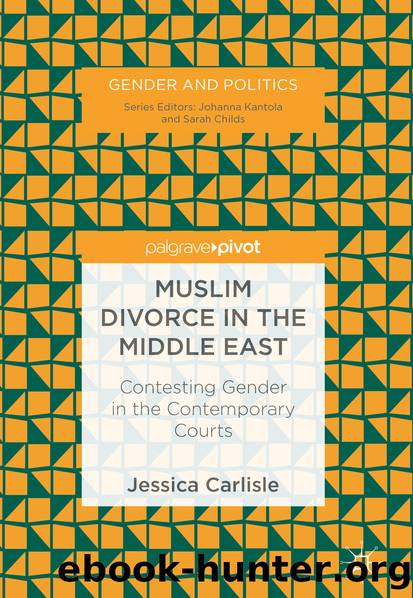Muslim Divorce in the Middle East by Jessica Carlisle

Author:Jessica Carlisle
Language: eng
Format: epub
ISBN: 9783319770079
Publisher: Springer International Publishing
3.3 Hearing Marital Disputes in the Marrakesh Court: Making Discord the Norm
Moroccan divorce practices were still evolving when I did my fieldwork three years after legal reform and there was a perception among academics, lawyers , and centres dâécoute staff that the family courts were inconsistently applying the 2004 Moudawana across the country. By 2015, some judges, lawyers, and civil society activists were still critical that judicial awards of post-divorce maintenance were arbitrary and did not take spousesâ financial situations into account.3 They also noted that a government commitment in 2004 to establish a fund to cover mothersâ and childrenâs maintenance when ex-husbands refused to pay it had only finally began work in 2011, was still not fully functioning and was not widely known about.4 Additionally, a provision to divide property acquired during marriage between ex-spouses was not being widely applied by the judiciary, which tended to assume that it was the property of the husband (Art. 49).5
There have been further obstacles to the effective implementation of the reformed Moudawana. In 2007, ex-wives were facing administrative difficulties in claiming their post-divorce financial entitlements, even after their ex-husbands had deposited them with the court (Boukaissi 2007). Litigantsâ capacity to benefit from the new Moudawana has also been hampered by poverty, illiteracy, incompetent lawyers and court administration, social and family pressure not to go to court, judicial corruption, and poor knowledge of the legal reform (Buehler 2016; Eisenberg 2011). Female, rural, and ethnic minority Moroccans widely believe that it is important to have âconnectionsâ in the court in order to secure a favourable ruling (Eisenberg 2011). There is also a common perception among these populations that the judiciary is willing to do personal favours for well-connected litigants, which may put some off going to the courts (Buehler 2016). Some judges have reportedly been resistant to intervening in domestic disputes since the family law reform, even if wives have explicitly requested a judicial divorce (Eisenberg 2011), with a few apparently initially resisting the new divorce provision by insisting that wives reconcile with their husbands (Boukaissi 2007).
Despite these obstacles, Moroccan Ministry of Justice (MoJ) statistics recorded a rapid rise in the number of judicial divorce claims after the reforms in 2004. What they, unfortunately, do not record is how many more of these requests were made in cities, since there has been anecdotal evidence that divorce in rural regions has been less accessible for wives (Eisenberg 2011: Newcomb 2012). Centre Hawwaâs clients had an advantage over the general population in having access to advice workers providing free legal expertise. They also lived in a major, cosmopolitan city which, despite massive income disparities, had relatively low rates of unemployment, poverty, and illiteracy; higher rates of fluency in Arabic (rather than Amazigh, or Berber); and easier access to the legal process than in rural Morocco (Eisenberg 2011). It is probable that there was a disparity between judicial divorce practice on the grounds of shiqÄq in Marrakesh and other urban centres and rural regions (Eisenberg 2011). Nevertheless,
Download
This site does not store any files on its server. We only index and link to content provided by other sites. Please contact the content providers to delete copyright contents if any and email us, we'll remove relevant links or contents immediately.
| Africa | Americas |
| Arctic & Antarctica | Asia |
| Australia & Oceania | Europe |
| Middle East | Russia |
| United States | World |
| Ancient Civilizations | Military |
| Historical Study & Educational Resources |
The Battle of Mogadishu by Matt Eversmann & Dan Schilling(754)
The Confidence Men by Margalit Fox(708)
The Spymaster of Baghdad by Margaret Coker(675)
A History of the Muslim World since 1260: The Making of a Global Community by Vernon O. Egger(671)
Jack the Ripper and the East End by Peter Ackroyd(635)
Empire of Fear: Inside the Islamic State by Andrew Hosken(621)
The Afghanistan File by Prince Turki AlFaisal Al Saud(613)
Islam At The Gates: How Christendom Defeated the Ottoman Turks by Diane Moczar(608)
Akhenaten by Dominic Montserrat(606)
The Crimean War by Winfried Baumgart(602)
The Jerusalem Diamond by Noah Gordon(594)
Beirut 2020 by Charif Majdalani(590)
The History of Jihad by Robert Spencer(587)
A Concise History of Greece (Cambridge Concise Histories) by Richard Clogg(584)
The Privatization of Israeli Security by Shir Hever(561)
Enemy in the East by Rolf-Dieter Müller(559)
Israel: Ancient Kingdom or Late Invention? by Daniel I. Block(557)
The Nine Lives of Pakistan by Declan WALSH(552)
Destroying a Nation: The Civil War in Syria by Nikolaos van Dam(547)
